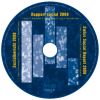Summary of the review of
Andreas Diekmann and Reto Meyer
![]()
Ecological awareness, environmental behaviour and ecological risks
The Swiss Survey on the Environment investigates various aspects of ecological awareness, environmental behaviour, and habits, using a random sample of 3,369 Swiss households. The detailed review by Andreas Diekmann and Reto Meyer* discusses initial survey results. Some of the same questions were posed in the Survey on the Environment in 1994, so that it is possible to show changes in environmental attitudes over time.The majority of the Swiss population shows marked ecological awareness; the dangers of climate change are classified as ‘high’ by more than four-fifths of the population. While many lament that the topic of the environment is now ‘out of fashion’, that is not confirmed by the results from the Swiss Survey on the Environment. Furthermore, the gap in ecological awareness that existed previously between the German-speaking and French-speaking parts of Switzerland has largely disappeared, although different evaluations still exist with respect to motor traffic. The degree of ecological awareness and behaviour is higher for women than for men. Environmentally friendly behaviour is shown to increase with neighbourhood integration, age, and decreasing income. Ecological awareness has a moderate effect on environmental behaviour, while knowledge of the environment and perceived environmental pressure scarcely influence behaviour. It is well-known from existing studies that behaviour is often more dependent on positive and negative incentives than on ecological awareness. If one wants to achieve climate goals, economic incentives are essential. A high level of ecological awareness in the population makes it easier to clear the way for such policies and programs.
The review also addresses how people perceive ecological and technological risks, people’s knowledge about the environment, political measures concerning the environment, and analyses whether certain social groups bear a disproportionate share of the burden of environmental pressure (‘environmental justice’). In the final section, the relationship between ‘time discounting’ and energy-saving investment is discussed.
* This review is included in the German and French editions of the Swiss Social Report 2008 only.
Update: FORS
